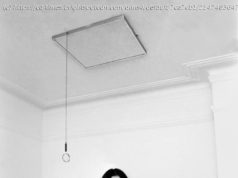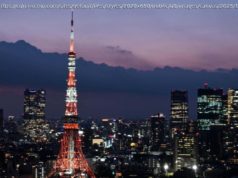 Amid the bustling night life of Shibuya, a major shopping and entertainment hub in Tokyo, the artist pastes stickers dealing with social issues to lamp posts and walls to attract the attention of passersby.
Amid the bustling night life of Shibuya, a major shopping and entertainment hub in Tokyo, the artist pastes stickers dealing with social issues to lamp posts and walls to attract the attention of passersby.
His latest postings target the controversial remarks made by Trump about women and minorities during his 2016 campaign.
The stickers show a figure resembling the U. S. president standing between figures in white capes, which symbolise members of the white supremacist group Ku Klux Klan, the artist told Reuters Television in a recent interview.
«My art was produced out of the fear of what may happen to Japan because of such a horrifying leader,» 281 Antinuke said,
Trump «is saying white supremacist things, things that are much more than America first,» he said.
Wearing sunglasses and a white surgical mask, 281 Antinuke declined to give his name or reveal his face, saying he feared retaliation for the political views contained in his art.
Graffiti is also punishable by heavy penalties and frowned upon by Japanese society.
Much of 281 Antinuke’s previous artwork criticized nuclear power, inspired after the March 11, 2011, earthquake and tsunami that caused a meltdown at the Fukushima nuclear plant.
The artist said the more political a sticker — other works have criticised Japan Prime Minister Shinzo Abe — the faster it is taken down.
On the busy streets of Shibuya, people who stopped to take a look were initially confused by the anti-Trump stickers.
«My first impression is that they are hard to understand, but once I get the context of it, it’s very expressive as an art form,» said Tokyo resident Manato Kato.






